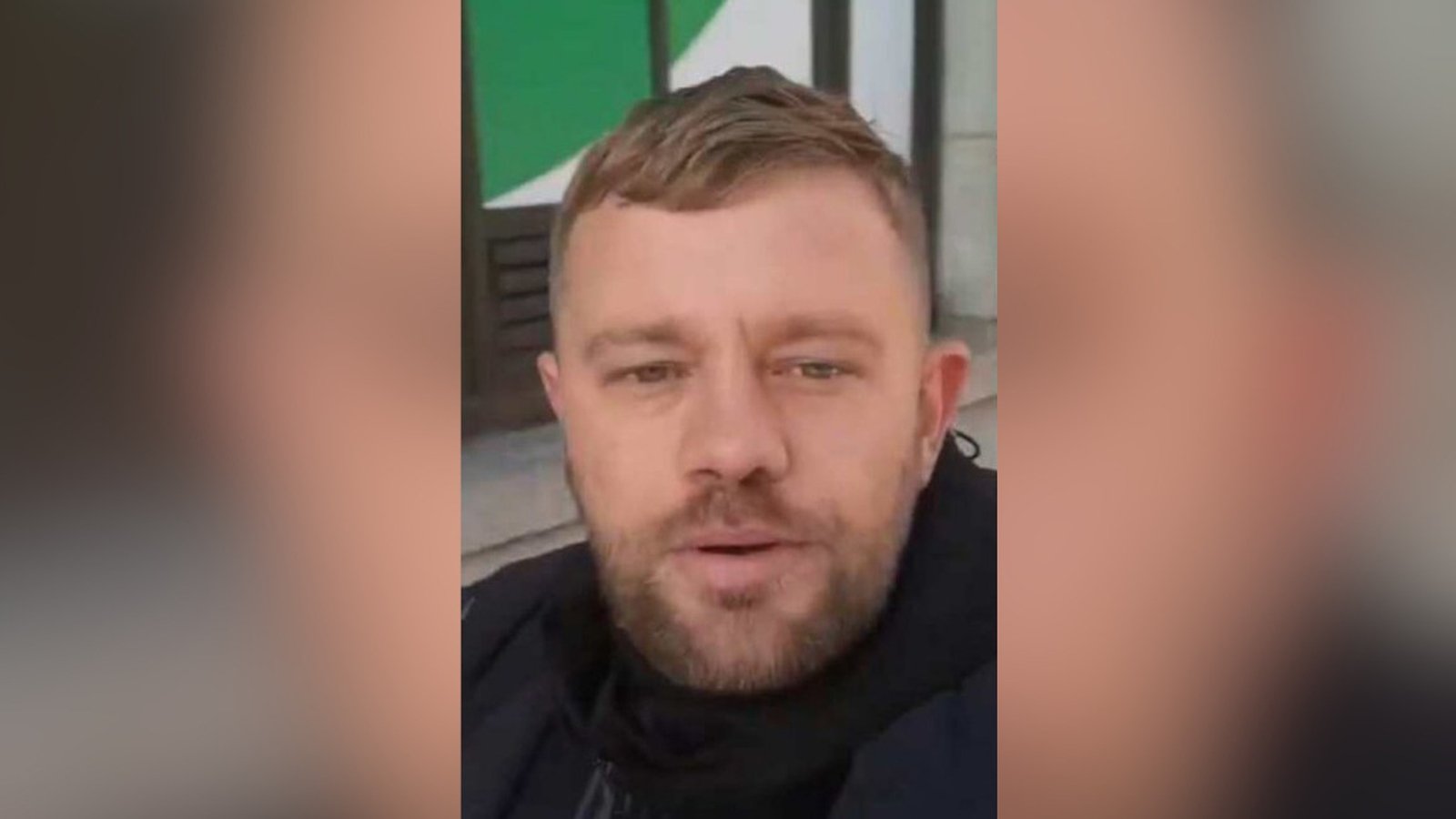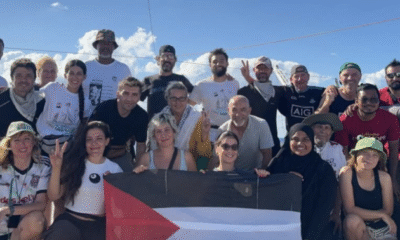Breaking News
Many small firms reliant on Jaguar Land Rover have ‘weeks left’ before damage ‘untenable’

This post was originally published on this site.
Small firms reliant on the production-halted British car maker Jaguar Land Rover, “may have at best a week of cashflow left to support themselves” with “urgent” action needed to support businesses.
Liam Byrne, the head of the influential Business and Trade Committee of MPs, wrote to Chancellor Rachel Reeves with the warning after meeting with the car maker’s suppliers.
“Larger firms, we heard, may begin to seriously struggle within a fortnight – and many are simply unclear how they will pay payroll costs at the end of October,” he said
“In short, many firms have merely “weeks left” before the financial impact on them becomes untenable and causes critical damage to key elements of the automotive supply chain.”
Money latest: HMRC can now take money direct from your account if you don’t pay
Since 31 August, production has been halted across the car-making supply chain, with staff off work as a result of the attack.
More than 33,000 people work directly for JLR in the UK, many of them on assembly lines in the West Midlands, the largest of which is in Solihull, and a plant at Halewood on Merseyside.
An estimated 200,000 more are employed by several hundred companies in the supply chain, who have faced business interruption with their largest client out of action.
Calls for government financial support had been growing, but Prime Minister Keir Starmer on Thursday afternoon said, “I haven’t got an outcome here to give to you today”.
A partial restart
It comes as JLR announced some of its IT systems are back online after being hit by a cyber attack late last month though production is still not expected to start again until 1 October at the earliest.
“The foundational work of our recovery programme is firmly underway,” a company spokesperson said in a statement.
As part of the partial restart, supplier payments can begin again.
“We have significantly increased IT processing capacity for invoicing,” the statement said. “We are now working to clear the backlog of payments to our suppliers as quickly as we can.”
The supply of parts to customers across the world can also now recommence.
After a workaround was reached on Tuesday to allow cars to move to buyers without the usual online registration, the financial system to process wholesale vehicles is back online.
“We are able to sell and register vehicles for our clients faster, delivering important cash flow”, the company said.
“Our focus remains on supporting our customers, suppliers, colleagues and our retailers. We fully recognise this is a difficult time for all connected with JLR and we thank everyone for their continued support and patience.”
Breaking News
YouTuber jailed over posts identifying asylum seekers

Read more on post.
A self-described citizen journalist and YouTuber has become the first person to be jailed in a landmark case for online posts which risked identifying asylum seekers in Ireland.
Paul Nolan, 36, of Mount Eagle Square, Leopardstown in Dublin, stood outside the IPAS centre at St John’s House, High Street, Tallaght, on 22 and 26 August 2024 and questioned teenage boys, a young woman, and three middle-aged men who were staying at the facility.
Nolan goaded applicants, saying, “In Ireland, you have no right to privacy”, and posted videos of his interactions on his YouTube channel.
The four clips revealed their faces and were captioned: “Time to document these people ourselves”, “These men are so aggressive, if you’re fleeing war, take your aggression there”, “Cheeky fella these economic welfare scammers”, “I know what I’d do if Ireland went to war, pick up a weapon and fight”.
Nolan, a father-of-three, questioned a man who said he was from Gaza about why he was here and not fighting in his own country.
One clip featured a recording of The Irish Rover by The Pogues and The Dubliners, while showing some applicants heading back into the building; it also had a banner saying “Face’s [sic] we are after”.
The community employment scheme worker pleaded not guilty at Dublin District Court to engaging in threatening, insulting and abusive words or behaviour, under the Public Order Act.
International protection applicants have the legal right to anonymity.
He also denied four counts under Section 26 of the International Protection Act 2015, which states that, without the consent, it is an offence to publish in a written publication available to the public or broadcast, or cause to be so published or broadcast, information likely to lead members of the public to identify a person as an applicant.
‘Tissue of lies, wrapped in a shroud of pseudo-citizen journalism’
Judge John Hughes noted that this was the first time a prosecution had been brought for this offence, which is punishable by a 12-month sentence.
He was given a ten-month sentence but had the final three months suspended on condition that he stays under supervised probation, completes an anger management counselling course, and remains away from IPAS facilities for two years.
The videos must also be taken down if that has not been done already.
“A disgraceful, glorious display of rudeness, hyena-like behaviour, and ignorance of the people involved”
His videos featured three middle-aged men, including one whose teenage sons, both minors, had been filmed and questioned by Nolan, along with another 15-year-old boy and his 22-year-old sister.
Judge Hughes described his conduct as repeated, premeditated and targeted.
He slated the accused, saying he used, “a tissue of lies, wrapped in a shroud of pseudo-citizen journalism.”
Sentencing, he brandished his conduct as “A disgraceful, glorious display of rudeness, hyena-like behaviour, and ignorance of the people involved.
Nolan attempted to convince the court that, in his role as an untrained citizen journalist, he had learned about a demonstration outside the building and went to investigate for his YouTube channel.
He knew the building had previously been used by Revenue, and undocumented, unvetted men of military age had moved in; however, he maintained that he was unaware it was an IPAS centre.
He claimed that he learned from a comment by Taoiseach Micheál Martin and from RTÉ news that 80% of asylum seekers were economic migrants.
Witnesses from Palestine and Jordan gave evidence.
The father of two boys filmed by the accused said his sons were aged 14 and 17 at the time.
Video evidence showed one of them was threatened by Nolan, who said he would break his nose because the teen had elbowed him out of his way.
He told an applicant approaching the centre: “I already got your face, no need to put your hand up”, and mimicked their accents and narrated his videos once, saying, “These are dangerous people we have walking the streets of Tallaght”.
Nolan already had 47 prior convictions, including public order charges, 19 for drug offences and he had also been jailed previously for six months for dangerous driving.
Cross-examined by prosecution counsel Oisín Clark BL, he claimed he still did not know what the building was when he returned to the centre days later to continue filming people.
Mr Clarke, in his closing speech, described Nolan’s version as “garbled, self-serving, and he contradicted himself”, and the barrister added that the accused had no credibility.
The defence pleaded with the court to acquit because it could not be established that anyone in the centre risked being identified; however, the judge held that the evidence was sufficient to convict.
Garda Inspector Nigel McInaw headed the investigation, which led to the examination of phone videos and bank records that linked the accused to the YouTube account.
Detective David Sheahan identified Nolan from CCTV evidence.
Breaking News
Police investigating death of Irish woman in Benidorm

This post was originally published on this site.
Spanish police are investigating the death of an Irish woman in Benidorm.
The woman – who died last week – has been named locally as Catherine ‘Cat’ Peckham, who was aged 65.
Police say they are treating the death as homicide.
Local media in Spain are reporting that Ms Peckham was originally from Cork, but had connections to the UK and had been living in Spain for some years.
It is understood Ms Peckham died after an incident in the Rincon de Loix area of Benidorm on 17 September.
Her body was taken to the Benidorm Medical Judicial Institute for an autopsy to be carried out.
Spanish police confirmed a 63-year-old British woman has been arrested in connection with the investigation.
A Spanish National Police spokesperson said: “We have launched a homicide investigation into the death of an Irish national and all possibilities are open at present.
A spokesperson for the Department of Foreign Affairs said it was aware of the case and was providing consular assistance.
Breaking News
EBU to vote on Israel’s participation in Eurovision

Read more on post.
The European Broadcasting Union (EBU) has confirmed it will hold a vote in November on Israel’s participation in the Eurovision Song Contest.
The unprecedented move could see Israeli broadcaster KAN expelled from next year’s competition.
It comes after several European broadcasters, including RTÉ, said they would boycott the contest if Israel took part.
The annual contest has been drawn into the controversy over Israel’s war in Gaza.
A letter sent today to the Directors General of member broadcasters said that a vote on the inclusion of KAN, the Israeli public service broadcaster, would be held at an extraordinary meeting of the EBU’s General Assembly, which will be held in early November.
The letter, signed by EBU president Delphine Ernotte Cunci, said the union had “never faced a divisive situation like this before”.
In a statement this evening, the EBU said: “We can confirm that a letter has been sent from the Executive Board of the European Broadcasting Union to Directors General of all our Members informing them that a vote on participation in the Eurovision Song Contest 2026 will take place at an extraordinary meeting of the EBU’s General Assembly to be held online in early November.”
Russia was banned from Eurovision after its full-scale invasion of Ukraine in 2022, but Israel has continued to compete for the past two years despite disputes over its participation.
Pro-Palestinian activists protested in Malmö, Sweden in 2024 and in Basel, Switzerland last May over Israel’s participation in the contest.
An RTÉ spokesperson confirmed that the broadcaster and Director General Kevin Bakhurst have received a letter from the EBU but declined to comment further at this time.
Earlier this month, Mr Bakhurst said that “RTÉ feels that Ireland’s participation would be unconscionable given the ongoing and appalling loss of lives in Gaza”.
He went on: “RTÉ is also deeply concerned by the targeted killing of journalists in Gaza, the denial of access to international journalists to the territory, and the plight of the remaining hostages.”
In the wake of RTÉ’s decision, the EBU had previously said it understood “the concerns and deeply held views around the ongoing conflict in the Middle East”.
It noted that it was consulting with members “to gather views on how we manage participation and geopolitical tensions around the Eurovision Song Contest”.
Eurovision is the world’s largest live televised music event. This year’s edition in Basel drew in 166 million viewers across 37 countries.
Austrian singer JJ won that competition, securing Austria the right to host the 2026 edition. The semi-finals and grand final are due to take place in Vienna next May.
Additional Reporting: Sharon Lynch, AFP
-
Culture2 days ago
Taylor Swift’s new cinema outing generates more than €12million in just 24 hours
-
Politics2 days ago
European Parliament snubs Orbán with vote to shield Italian MEP from Hungarian arrest
-
Culture2 weeks ago
Life, loss, fame & family – the IFI Documentary Festival in focus
-
Health3 days ago
EU renews support for WHO’s Universal Health Coverage Partnership
-
Culture2 months ago
Fatal, flashy and indecent – the movies of Adrian Lyne revisited
-
Culture3 days ago
Twilight at 20: the many afterlives of Stephenie Meyer’s vampires
-
Environment6 days ago
Key oceans treaty crosses threshold to come into force
-
Culture1 week ago
Farewell, Sundance – how Robert Redford changed cinema forever










































